Is Iran waiting for the fate of Syria?
In fact, Iran and Syria, fortunately, have little in common. It is clear that in Iran, the American intelligence agency also made a hand in the protests, even if indirectly (although the director of the CIA, Mike Pompeo, denies this in every way). But in Iran, unlike Syria, there is still a much stronger statehood, which, moreover, is based on the rule of the national and religious majority.
Unlike many other states of the Middle East, Iran is not a political "remake". If Iraq, Syria, Jordan and even Saudi Arabia in its present form have arisen as a result of the collapse of the Ottoman Empire, then Iran has a thousand-year tradition of statehood with approximately the same borders. Until the beginning of the twentieth century, the country was ruled by Turkic dynasties of origin, which did not prevent them from adopting Persian and Persian identity.
The active participation of the Turkic tribes of southern Azerbaijan in the management of Persia led to the fact that the Azerbaijanis, who are, in fact, the largest national minority of the country, played and play a huge role in the governance of the country. Currently living in Iran from 12-15 to 20-30 million Azerbaijanis. Such a difference in the estimates of the number is explained by the fact that many Iranian Azerbaijanis perceived the Iranian national identity so much that they identify themselves, first of all, as Iranians, and not as Azerbaijanis. For example, the current great Iranian Ayatollah, Ali Khamenei, is Azerbaijani by birth. There are a lot of Azerbaijanis among the representatives of the highest military, political, and economic elite of modern Iran, and overwhelmingly, they do not feel at all disadvantaged.
If in Shah Iran, emphasis was placed on Persian identity, in connection with which the Shah government made every effort to eliminate national differences between individual groups of the country’s population (and, first of all, sought to “persist” Azerbaijani and Kurdish groups), after the Islamic revolution The first plan was a common Iranian identity, sealed by religious and political foundations. This allowed to consolidate around the ideas of the Islamic revolution representatives of almost all ethnic groups in the country and, above all, of course, Iranian Azerbaijanis. Despite the fact that there are separate political groups of an autonomist nature abroad, in general Iranian Azerbaijanis cannot be viewed as an opposition minority or even as a minority, they are so integrated into the political and religious life of the country and play such a serious role in it. In this regard, the Persians as the main people of the country are also joined by the less numerous Iranian-speaking peoples - Talysh, Gilians, Masendaran, Lurs and Bakhtiars. There have never been any serious problems in Iran with the Turkic-speaking peoples - Iranian Turkmen, Qashqais, Afshars and some other groups.
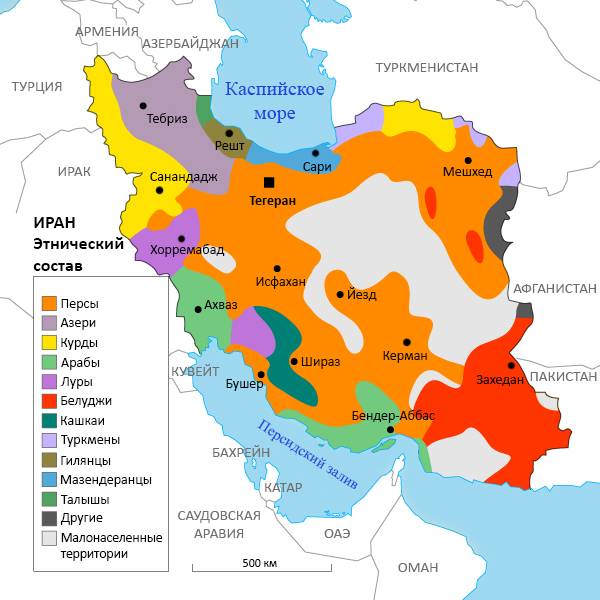
One of the potentially problematic ethnic groups of the multinational Iranian population is the Kurds. Of course, unlike Turkey, Syria or Iraq, Iranian Kurds are much less politicized, but, nevertheless, Kurdish national liberation organizations have been active in Iran since Shah times. Kurdish tribes, whose total number in Iran reaches 5,5-6 million people, inhabit the islands of Ilam and Kermanshah and Western Azerbaijan. A separate and very large enclave of the Kurdish population is located in another part of the country - in the north-east of Iran, in the North Khorasan ostan. Here, on the border with modern Turkmenistan, the Safavid Shah Abbas resettled warlike Kurds to defend the Persian borders from the Turkmen nomadic tribes. The Kurds are the most multi-confessional inhabitants of Iran. Among the Iranian Kurds are dominated by Sunnis, many Shiites, there are followers of such interesting religious groups as the Ali-Ilahi.
In the 1940-s under the auspices of the Soviet Union on the lands of Iranian Kurdistan was created so-called. Mehabad Republic Then, during the existence of the shah of Iran, the government pursued a policy of assimilation of all the Iranian-and-Turkic groups of the population. The Kurds were no exception. When the Islamic Revolution took place and a political regime, opposing the United States, became established in Iran, Washington began to seek to play the Kurdish card in Iran. If in Turkey, NATO structures opposed the Kurdish national movement, then the national movement of Iranian Kurds met with full support in the West. This is how PJAK (Kurd. Partiya Jiyana Azad a Kurdistanê) appeared in Iran - the Party of Free Life in Kurdistan, which political scientists consider to be the Iranian version of the Kurdistan Workers' Party. There is nothing strange in this, since the party is guided by the ideas of Abdullah Ocalan and is ideologically related to the Turkish and Syrian Kurdish movements. Whatever it was, but this organization in 2004 year formed its militarized wing - Self-defense of Eastern Kurdistan, which is trying to wage a sluggish guerrilla war against Iranian security officials in remote areas of Iranian Kurdistan. However, most Iranian Kurds do not participate in this fight.
On the other hand, the Iranian leadership is taking all possible measures to ensure that the majority of the country's Kurdish population remains loyal to Tehran. First, the socio-economic situation in the Kurdish areas of the country that were once among the most backward provinces of Iran is gradually improving. Especially large funds are invested by the Iranian government in the fight against unemployment. Indeed, very often it is the absence of any kind of work and income that makes young people (and young people among Kurds, by virtue of high birth rates, have a lot) to join radical organizations. In addition, the government is investing in the construction of roads and enterprises in Iranian Kurdistan, which also contributes to improving not only the standard of living of the population, but also the controllability of the region.
Secondly, the official Tehran demonstrates a desire for dialogue with Iraqi Kurdistan, emphasizing that the problems of the Kurdish people are not alien to them. Although, of course, it is clear that Iran as a whole has a very negative attitude towards the concept of creating a Kurdish state in the Middle East, knowing full well the danger of these plans for the territorial integrity of the Iranian state itself.
Naturally, the United States, in attempts to destabilize the political situation in Iran, can rely on individual Kurdish groups as well. Of course, the American special services are well aware that the hands of some relatively few Kurdish radicals cannot change the durable regime of the Islamic Republic, but against the background of speeches by radicals in Iranian cities, the attacks of radicals in Kurdistan may be just the way. Moreover, the United States already has an established tradition of interaction with the same Iraqi Kurds in neighboring Iraqi Kurdistan. At the same time, unlike in Turkey or Syria, in Iran, radical movements do not enjoy broad support from ordinary Kurds living in the country's western provinces. That is, it will be very difficult to deploy a large-scale armed movement against the government in this territory.
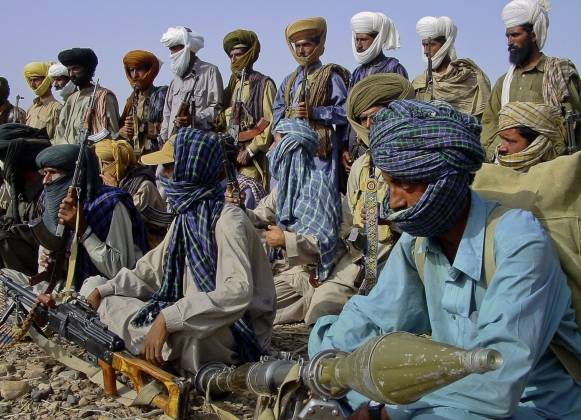
Another nation among which national-liberation organizations have been active for a long time is Iranian Baluchs. They inhabit the remains of Sistan and Baluchistan in the south-east of the country, the most remote and underdeveloped Iranian province. Unlike the 90% of the population of Iran, the Balochi are Sunni. They are closely associated with their tribesmen living in neighboring Afghanistan and Pakistan. In fact, it is a conglomeration of tribes that control vast territories along the coast of the Indian Ocean and inland to Afghanistan and Iran. The Baluchs still retain tribal divisions, most of them engaged in traditional nomadic and semi-nomadic cattle breeding, while many do not disdain to smuggle drugs and weapons. The socio-economic situation of the population of Baluchistan is even more difficult than in Iranian Kurdistan, although the government here too is trying to be active in solving the social problems of the local population.
In Balochistan, stretching to the lands of Iran, Afghanistan and Pakistan, state borders are very transparent. This allows the Baluchs to easily cross them for both criminal and political purposes. Back in 1980, the Baloch liberation movement under the leadership of Abdul Aziz Mollazadeh appeared in Iranian Balochistan, which was actively sponsored by Iraqi special services (according to the well-known principle “the enemy of my enemy is my friend”). With the help of the Baloch resistance, Saddam Hussein wanted to, if not crush Iran, then seriously weaken it. But this goal was not achieved by the Iraqi leader.
But the Iranian secret services successfully defeated the Baloch liberation movement, but it was replaced by a much more dangerous movement - Jundall, Warriors of Allah. This organization launched an armed struggle against the Iranian authorities about fifteen years ago, managing to destroy several hundred Iranian police and military personnel during this time. The damage from the activities of the Jundalli Iranian authorities are much greater than from the Kurdish radicals in the west of the country.
Thus, the organization conducted a series of high-profile terrorist acts, such as October 18 2009, blew up a whole group of high-ranking officers of the Islamic Revolutionary Guard Corps who arrived in Pishin to meet with the sheikhs of Iranian Balochistan tribes. During this terrorist attack, in particular, the Deputy Commander of the Land Forces of the Iranian Revolutionary Guards Corps of Iran General Nur-Ali Shushtari and the Commander of the Corps in Sistan and Baluchistan provinces, General Rajab Ali Mohammadzade, were killed. All these attacks have led to the fact that in Tehran are very interested in the situation in a remote province. In addition to funds for its socio-economic development, military contingents were significantly strengthened, including the units of the Islamic Revolutionary Guard Corps stationed in Sistan and Balochistan. The central government even opened a military school for the local population in order to train personnel for the local security forces from among the Baluchi themselves.
For Iran, Baluchistan is a very strategically very important region, since it is here that one of the key highways for communication with China and the countries of South Asia must pass. Therefore, it is quite clear to whom the destabilization of Balochistan is beneficial. Washington will play the Baloch card further, knowing full well that this is one of the most effective tools in the fight not only against Iran, but also against developing Iranian-Chinese economic relations.
However, neither the Kurdish nor the Baluch movements, of course, do not “pull” on the role of serious forces in the US struggle against Iran. Thus, in Syria, the United States emphasized the Arab-Sunni majority, who was displeased, including for objective reasons, with the policies of Bashar al-Assad and his Alawite entourage. In Iran, the situation is somewhat different. Shiites in power make up 90% of the country's population, and in turn, of these 90%, most fully share the Iranian political identity. There is no such contradiction, as in Syria (Sunni Arabs against Alawites, Kurds against central government), and there cannot be. On the other hand, one can hardly seriously count on Maidan, that is, to overthrow the government as a result of the performance of students from the capital and westernized strata of the population. In Iran, too much power and too powerful power structures, moreover, the main part of the population is more likely to support power than to distance itself from it, as the pro-Western intelligentsia does.
It is unlikely that the hopes of the USA will be justified for the betrayal of a part of the Iranian generals. Unlike Libya or Iraq, the military elite in Iran is more reliable and patriotic, especially since there are actually two armies - the armed forces proper and the Islamic Revolutionary Guard Corps, which also includes all kinds of armed forces and very efficient units. But the most important thing is that Iran is an established civilization that will try to solve its internal problems without resorting to the intervention of third states.
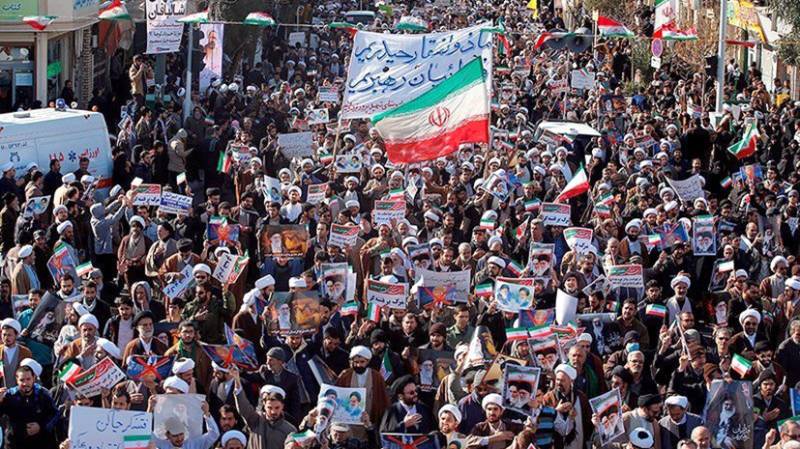
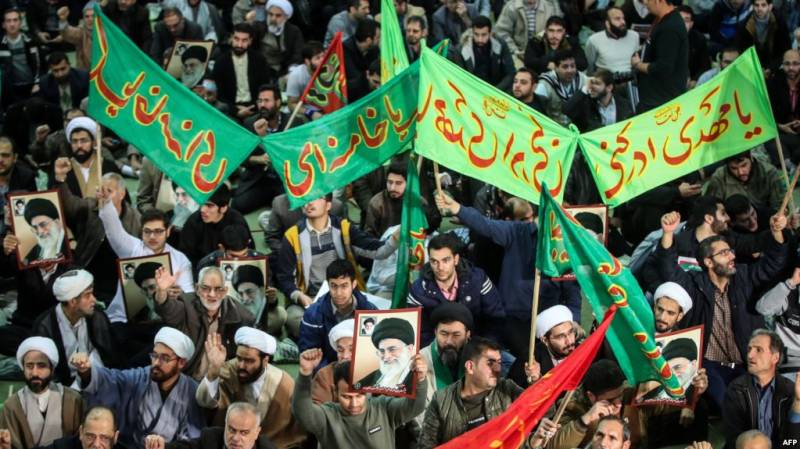
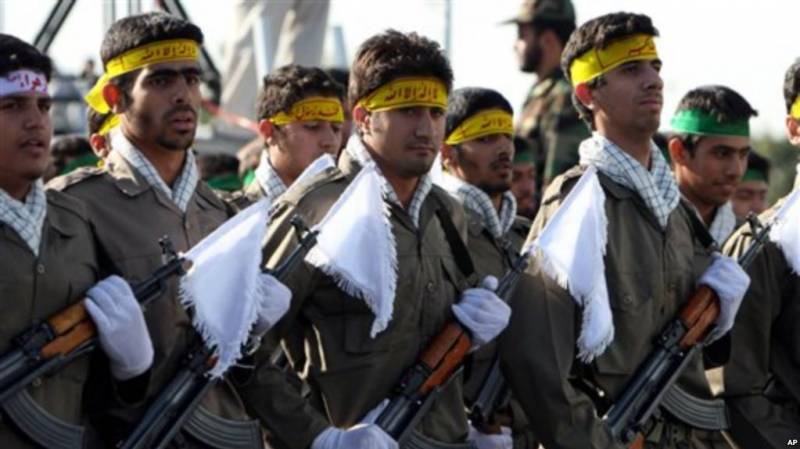
Information